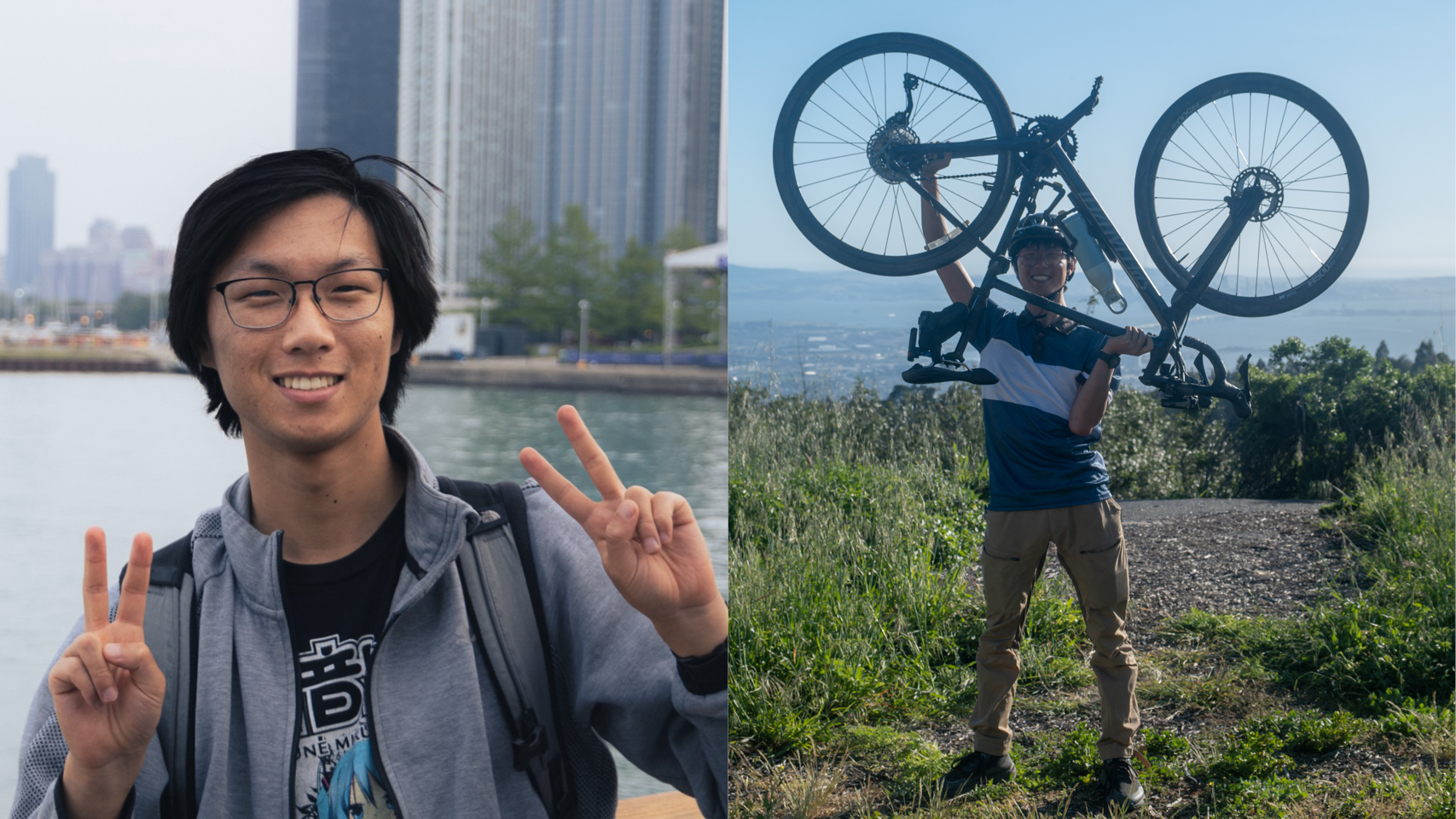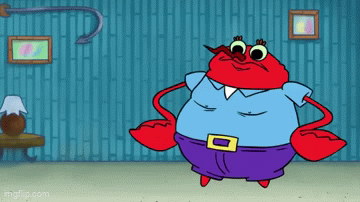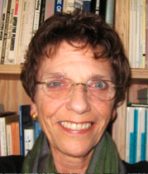-
September 25, 2024
Meet 2024-2025 PacTrans Fellow: Aaron Wang

Today we’re spotlighting one of our upcoming 2024-2025 PacTrans Graduate Fellows, Aaron Wang!
What’s your current role?
I am a 4th year undergraduate student studying Materials Science and Engineering at BerkeleyUnemployed bum, recent Berkeley grad
What’s your favorite college memory?
My favorite memories mostly come from volunteering at BicyCal, the local bike repair club at Berkeley. Everyone there is super passionate about bikes while also being absolutely hilarious, which makes for a great atmosphere. It’s fun seeing random people roll up and tell stories about how screwed up their bike is or how they got into various crashes and it’s also very satisfying seeing their faces light up once their bike is fixed. There are also times when someone brings in a really nice or unique bike where everyone in the shop stops what they are doing to admire it; everyone loves a cool bike and it’s memorable when one comes in. BicyCal is also a really great community, with people being down for karaoke and sleepovers after shop hours, nighttime goon rides up the local hills behind campus, and raiding Blondie’s (colloquially known as “Abe’s Fine Dining” in BicyCal speak), the local pizzeria, after said goon rides.
There’s a one step process for planning out goon rides, and here’s generally how it goes:

Here’s a video that can hopefully give a general vibe of what BicyCal is like: https://www.youtube.com/watch?v=EpMyUwxutOI
Describe your career path.
Coming out of high school, I really enjoyed (experimental) chemistry, so I wanted to pursue that for undergrad. However, not knowing that computational chemistry was a thing, I didn’t want to be restricted to living near a wet lab, so I thought some engineering with a lot of chemistry was the next best bet. After some soul searching, I settled on materials science. After getting into Berkeley, I realized I had bamboozled myself into taking a solid-state physics major with barely any chemistry, but I was too lazy to switch out of it. Thankfully, it all worked out such that I enjoyed the classes, but more importantly, the people around me. However, using RNG to pick my major came to bite me in the end when I was trying to figure out what to do after I graduate, as I didn’t have a strong interest towards any aspect of materials science that I would like to pursue the rest of my life in (not to say that the material is boring though; it is anything but boring and I would definitely do it again if I were to restart my undergrad).So I went back to the drawing board, and remembered my experience interning at the University of Tokyo one summer versus at Argonne National Lab the next summer, and how much more convenient the public transit system was in even the suburbs of Tokyo compared to the Chicagoland suburbs. There was always something to do in Tokyo and ways to get there without a car; however, although there’s always something to do in Chicago, something about having to walk (or bike) 6 miles to the nearest train station along what basically amounts to a state highway—with some sections of the road missing sidewalks—only to wait an hour for the next train to arrive made my blood boil. So out of pure spite, I applied to programs that would put me in a position to be able to address these transportation/infrastructure grievances, and here I am now.
Looking forward, I would like to focus more on transit-oriented development as a means of giving people a reason and space to hang out with friends and family as well as a means to get there without needing to own a car. One of the main gripes I had with station designs (i.e., train, light rail, etc.) in the US is how they are basically islands surrounded by roads and surface parking, while in Japan, the train stations are the centerpiece of a town, with pedestrian plazas, malls, and restaurants accessible as soon as you walk outside of the station. Moreover, especially in urban areas, I believe that owning a car (coupled with the enormous costs associated with it) should not be a prerequisite to obtaining mobility, which is why I would like for public transportation to play a bigger role in the US. To that end, being an avid cyclist, I would also like to see more infrastructure dedicated to enabling micromobility, such as bike boulevards or protected bike lanes that would encourage people to ditch the cars for short distance trips as well as hopefully get people to live a more active lifestyle and have a chance to interact with more people everyday.
What’s your greatest professional accomplishment?
My greatest professional accomplishment is probably getting this fellowship. Throughout undergrad, I never really excelled at anything (both inside and outside of the classroom) nor figured out exactly what I wanted to do with my life. I’ve always been overshadowed by my peers who have figured their futures out; they’ve all done amazing things with their research and internships that have led them to getting published, receiving awards, or getting return offers. However, what constantly struggling to find a niche for myself within MSE has led to is experience jumping between research areas—such as from polymers to environmental science to electrochemistry to mechanical fatigue—and dabbling in theoretical, computational, and experimental work in the process. As a result, I’ve not been able to contribute long enough to get any recognition for the work I’m doing or make any contributions towards papers in any one group; although the silver lining is that I’ve been able to slowly but surely figure out which fields I liked and disliked. So when I decided to give civil engineering a try and not only get into the University of Washington but also have my tuition paid for by this fellowship, it was my first time getting recognized and having someone/something invest in my future, so it makes me especially proud that someone saw some potential in me despite stumbling my way into this field whilst having no prior experience in anything related to transportation or civil engineering.How will PacTrans benefit you?

In all seriousness, the money is a big help, allowing me to pursue a completely new area of study without having to worry as much about finances as well as worrying whether I’m making the best use of the time I paid tuition money for. I also feel reassured that there is an entire organization behind my back that’s willing to support me and my educational journey, and that definitely helps to ease a bit of the imposter syndrome whenever I question whether or not I’ve made a mistake exploring something I have no prior connection with and should’ve stuck with materials science.
Going forwards, I hope to be able to use PacTrans as a jumping off point to be able to meet some more amazing individuals and to be able to utilize PacTrans’s connections to learn as much as I can about planning, infrastructure, and policy to be able to apply to my hometown in order to make it a more welcoming place to live for those without personal automobiles.
What are some hobbies or interests you have? A fun fact?
I really enjoy photography (and by extension videography) and biking. Seeing many friends and family come and go throughout the past 4 years was a pretty poignant reminder for me to try to make the most of what’s in front of me, the magic of what makes a certain experience fun or memorable is lost after it ends, regardless if you come back to the same spots with the same people to try to replicate that magic. Photography is not only my way of capturing and remembering those moments, but also my emotions and thoughts during said moments through the colors and composition. Whereas photography excels at capturing snapshots of an experience, I’ve also dabbled in videography to capture people’s mannerisms, funny moments and quotes, as well as the general atmosphere of an experience. Plus, I think that editing said clips into a coherent video offers a lot of creativity on how to present my media and emotions and it’s very heartwarming when the people I share the video say that they liked and resonated with it. Here’s another example of one of the videos that I am proud of: https://www.youtube.com/watch?v=J-6GADyBQKsOn the other hand, I find biking enjoyable as both a form of transportation and group activity. For me, biking is much less stressful than driving and it’s easier to talk with the people I’m riding with. In addition, as a result of owning my bike and riding it around, I’ve met so many friends that I wouldn’t have otherwise been able to meet, such as the people from BicyCal. I also enjoy biking because it is an activity that brings together people regardless of their athletic ability: from leisurely group rides to struggling to climb up a mountain and all of the other moments in between, there are always things to look back fondly on. In addition, unlike driving, where other people on the road pressure you to go as fast as (legally) possible, you are able to slow down and enjoy your surroundings while on your bike and you are also able to go onto trails that allow you to see views that would otherwise be impossible to see without a bike. Biking is also a fun form of exercise I can do with friends without ruining my knees.
Other than that, I also like reading manga in my spare time. It is a pretty relaxing way to spend time without staring at a screen. At the moment, I’m currently reading Blue Box and Frieren.
Want to know more about Aaron? Connect with him on LinkedIn!
About the PacTrans Graduate Fellowship
The PacTrans Fellowship is focused on students interested in pursuing a master’s degree and with aspirations of being industry leaders in the transportation field. In addition to receiving a quality education, PacTrans fellows also participate in an internship, allowing for their knowledge obtained in the classroom to be supplemented with practical knowledge of the transportation industry.


